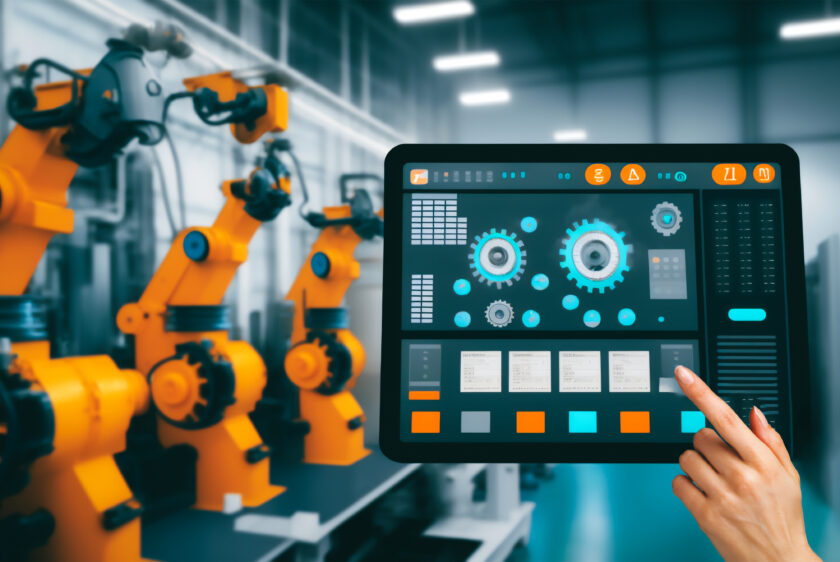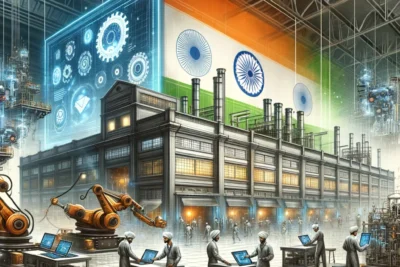Abstract
The era of Smart Manufacturing has ushered in a technological revolution that transforms how factories operate, optimizing processes, enhancing quality, and improving efficiency. However, the success of Smart Manufacturing hinges not only on cutting-edge technology but also on a skilled and empowered workforce. This paper delves deep into the critical role of workforce empowerment in Smart Manufacturing, exploring various training and consulting opportunities. It highlights the challenges typically experienced by manufacturers in this digitalization journey, and how the lack of talent can significantly slow down progress. As part of the recommendations on how to create an empowered environment, we discuss the importance of choosing the right strategic partner, such as Optimon, to facilitate this transformative journey.
I. Introduction
A. The Smart Manufacturing Paradigm
Smart Manufacturing integrates advanced technologies like the Internet of Things (IoT), Artificial Intelligence (AI), data analytics, and automation into manufacturing processes. It offers unparalleled opportunities for efficiency, quality improvement, and cost reduction. However, the successful implementation of Smart Manufacturing requires a workforce equipped with the right skills and knowledge.
B. The Importance of Workforce Empowerment
Empowering the workforce is central to Smart Manufacturing’s success. A skilled and knowledgeable workforce can harness the full potential of these technologies, driving innovation and sustainable growth. Therefore, investing in workforce empowerment is not just a strategic decision; it’s a necessity in the age of Smart Manufacturing.
II. Challenges in the Digitalization Journey
A. Talent Shortages
One of the most significant challenges manufacturers face is the shortage of talent with expertise in Smart Manufacturing technologies. These skills are in high demand, and the supply often falls short.
B. Resistance to Change
The shift to Smart Manufacturing often encounters resistance from the existing workforce. Employees may be hesitant to embrace new technologies and processes.
C. Skills Gap
Even when talent is available, there can be a gap between the skills workers possess and the skills needed for Smart Manufacturing. Bridging this gap is essential.
D. Rapid Technological Advancements
Smart Manufacturing technologies evolve rapidly. Manufacturers must continually update their workforce’s skills to remain competitive.
III. Creating an Empowered Workforce
A. Workforce Assessment
Before implementing Smart Manufacturing, it’s crucial to assess the existing workforce’s skills and knowledge gaps. Identifying areas that need improvement is the first step in creating an empowered workforce.
B. Customized Training Programs
Collaborate with a trusted partner like Optimon to develop customized training programs tailored to specific needs. These programs can include a mix of on-site, remote, and self-paced learning to accommodate different learning styles and schedules.
C. On-the-Job Training
On-the-job training is invaluable in Smart Manufacturing. Consultants from Optimon can work closely with workers to ensure they can apply their newly acquired skills directly to their tasks.
D. Continuous Learning
Smart Manufacturing is an evolving field. Encourage a culture of continuous learning within the organization, with the support of Optimon’s expertise and resources.
IV. Optimon: Your Strategic Partner in Workforce Empowerment
Optimon stands as a strategic partner in empowering the workforce for Smart Manufacturing. Here’s how Optimon supports manufacturers in this endeavor:
A. Expertise in Smart Manufacturing
Optimon brings deep expertise in Smart Manufacturing across industries. Our consultants understand the unique challenges and opportunities of Smart Manufacturing and can guide workforce development accordingly.
B. Customized Training Programs
We collaborate with manufacturers to create training programs tailored to their specific needs and objectives. This ensures that the training aligns closely with the company’s goals and technological environment.
C. On-Site Support
Optimon’s consultants provide on-site support to facilitate on-the-job training and skill application. This hands-on approach ensures that workers can immediately apply what they’ve learned.
D. Access to Cutting-Edge Technology
As a technology solutions provider, Optimon offers access to cutting-edge Smart Manufacturing technologies. Workers can learn and practice on actual equipment and systems.
E. Continuous Learning Culture
Optimon fosters a culture of continuous learning within organizations, encouraging workers to embrace ongoing education and skill development. This culture is vital in the rapidly evolving field of Smart Manufacturing.
V. Conclusion
In the age of Smart Manufacturing, technology is a powerful enabler, but it’s the empowered workforce that drives success. Workforce empowerment through training and consulting is not just a support function; it’s a strategic imperative. Manufacturers must invest in their workforce to unlock the full potential of Smart Manufacturing.
Optimon is ready to assist manufacturers in this journey. Our expertise, customized training programs, on-site support, access to cutting-edge technology, and commitment to a culture of continuous learning make us a strategic partner in workforce empowerment. Together, we can ensure that the workforce is not just prepared for the challenges of Smart Manufacturing but is actively shaping its future. Workforce empowerment is the linchpin to unlocking the transformative power of Smart Manufacturing and ensuring a prosperous future for manufacturers across industry verticals.



